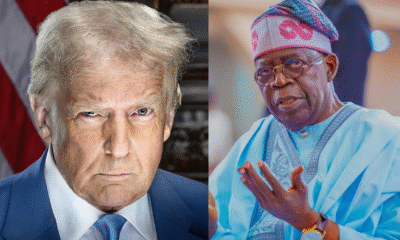Politics
How Record Military Spending Threatens Global Peace & Devt -UN

A decade-long increase in military spending stands as a threat to global peace and development, the United Nations has warned.
It said in a recent report that military build-up, backed with global military spending hit a record high in 2024, soaring by more than nine per cent from 2023 and signaling a dangerous move away from the principles of the UN Charter.
The UN stated these through the report of the UN Secretary-General, General António Guterres, titled: The Security We Need: Rebalancing Military Spending for a Sustainable and Peaceful Future.
“The evidence is clear: excessive military spending does not guarantee peace,” says UN Secretary-General António Guterres who launched the report today. “It often undermines it – fueling arms races, deepening mistrust and diverting resources from the very foundations of stability.”
Global military spending, which hit $2.7 trillion last year, according to the Stockholm International Peace Research Institute, is projected to reach $6.6 trillion by 2035 if current trends persist. The massive diversion of resources poses a serious threat to humanity’s future by undermining sustainable peace and development.
Moreover, the report reveals a stark paradox: as military spending soars to record levels, the world is critically off-track to meet the 2030 deadline for the Sustainable Development Goals (SDGs)—humanity’s blueprint for a more equitable future. The annual financing gap for the SDGs is already $4 trillion and could widen to $6.4 trillion in the coming years.
READ ALSO: Good Governance, Recipe For Nigeria’s Peaceful Co-existence – Stakeholders
READ ALO: Insecurity: IGP Tightens Security On Lagos-Ibadan Expressway
Global military spending is not only increasing in absolute terms, but its share of the global economy is rising as well. Since 2022, it has climbed from 2.2 per cent to 2.5 per cent of the world’s Gross Domestic Product (GDP) and from 6.6 per cent to 7.1 per cent of government budgets.
The shift is widespread, with more than 100 countries boosting their military spending in 2024 alone.
Additionally, development financing has not kept pace with rising military spending. Official development assistance (ODA) has reduced even as the development financing gap widens, the report warns.
Rising military spending is expected to add to already high levels of public debt, burdening future generations and limiting their development.
For example, the report reveals that a one percent increase in military spending in low- and middle-income countries is linked to an almost equal reduction in public health services, potentially jeopardizing pandemic preparedness and other life-saving health programmes.
“We need a new vision of security—human-centered and rooted in the UN Charter. A vision that safeguards people, not just borders; that prioritizes institutions, equity and planetary sustainability,” says the UN High Representative for Disarmament Affairs, Izumi Nakamitsu.
The report is a critical intervention at a global inflection point—a time when people feel increasingly insecure, new interconnected risks are emerging and inequalities continue to grow.
“We are in a world where fissures are deepening, official development assistance is falling, and human development progress is slowing,” adds the Acting Administrator of the UN Development Programme, Haoliang Xu.
“But we know that development is a driver of security and multilateral development cooperation works. When people’s lives improve, when they have access to education, healthcare, economic opportunities and when they can live lives of dignity and self-determination, we will have more peaceful societies and a more peaceful world.”
READ ALSO: Acute Food Scarcity Hits 31.8m Nigerians -FG
READ ALSO: Why Nigeria should Ban Genetically Modified Organisms (GMOs) Immediately
The report calls for a fundamental recalibration of global security and development strategies, prioritizing diplomacy and international cooperation to reverse the current trend of escalating military spending. It makes a clarion call for investing in sustainable development because even a small fraction of military spending can make a big difference in people’s lives.
Less than four per cent (or $93 billion) of $2.7 trillion is needed annually to end hunger by 2030. A little over 10 per cent ($285 billion) can fully vaccinate every child.
With $5 trillion, the world could fund 12 years of quality education of every child in low- and lower-middle-income countries.




























